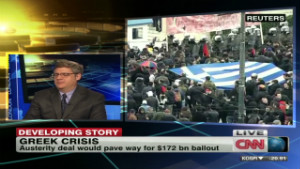Police clash with protestors during a demonstration involving thousands of Greek civilians on February 10, 2012, in Athens.
STORY HIGHLIGHTS
- NEW: A few scuffles break out as protesters rally in Syntagma Square, outside Parliament
- Greek lawmakers are due to vote on the new eurozone bailout deal Sunday
- The prime minister plans to address the nation later
- Greek lawmakers must approve a reform package to get e new bailout deal
Athens, Greece (CNN) -- Greece's Cabinet approved austerity measures demanded in return for a new eurozone bailout of the debt-stricken country Saturday, a day ahead of a crucial vote in Parliament.
The Cabinet move comes after several ministers resigned from the coalition government and clashes between hooded youths and riot police disrupted a protest rally.
Lawmakers are discussing the bill Saturday before the full Parliament votes on the deal Sunday.
 Can Greece prevent a massive default?
Can Greece prevent a massive default?In a speech Friday evening, Prime Minister Lucas Papademos urged the Cabinet to shoulder the "burden of responsibility" and approve the deal.
"Any other development would be disastrous," he said, according to a transcript released by his office.
Papademos is expected to address the nation, which is feeling the pain of a prolonged recession, later Saturday. There is much public anger over the repeated rounds of austerity measures and cuts.
 Greek teacher's income cut by 30%
Greek teacher's income cut by 30%Parliamentary approval would pave the way for the eurozone finance ministers to sign off on the new €130 billion ($172.6 billion) bailout deal next week.
Greece needs the funds in order to meet €14.5 billion in debt repayments due next month.
Some isolated scuffles broke out as protesters rallied in Syntagma Square, in front of the Parliament building, but the mood was calmer than a day earlier.
Friday's protest dispersed after youths smashed pavements and began throwing stones and pieces of marble, as well as Molotov cocktails, at the police, who responded with stun grenades and teargas.
Meanwhile, a 48-hour strike called by trade union leaders in protest against the cuts rolled into its second day Saturday.
Former Prime Minister George Papandreou told the PASOK parliamentary group, the majority party in the coalition, that Papademos was right about the urgent need for the deal and that lawmakers must explain to the Greek people what bankruptcy would mean for the country.
Antonis Samaras, leader of the New Democracy party, the other main group in the coalition, told his lawmakers that he would call for an early election if a separate agreement was reached on Greece's private sector debt.
In his address to the Cabinet, Papademos said approval of the bailout deal was essential to ensure Greece's future in the 17-nation eurozone and overcome the current economic crisis.
"It is absolutely necessary to complete the effort that began almost two years to consolidate public finances, restore competitiveness and economic recovery," he said.
Investors in markets around the world watched the Greek Parliament nervously Friday as the drama played out.
Even if the sweeping reform package agreed to by Greece and the so-called troika, made up of the European Commission, European Central Bank and International Monetary Fund, is approved Sunday in Parliament, Greek lawmakers must still do more.
Jean-Claude Juncker, the prime minister of Luxembourg and head of the Eurogroup, which brings together euro-area finance ministers, said Thursday that other assurances were also needed from Athens before the bailout could be paid out.
Greece's political leaders must pledge that they will continue to implement the measures after upcoming elections, he said.
Athens must also find a further €325 million in "structural expenditure" cuts for 2012, Juncker added.
It is not clear whether Greece's lawmakers have yet hammered out a way to make the additional cuts.
The leader of the third member of the coalition government, the right-wing LAOS party, told reporters Friday his party would not back the proposed deal.
All four of the party's ministers, including the transport minister and deputy defense minister, then resigned.
Deputy Foreign Minister Mariliza Xenogiannakopoulou, of PASOK, also stepped down.
LAOS, the smallest member of the coalition, holds 16 seats in the 300-seat parliament, while PASOK has 153 and New Democracy 83.
The bailout deal, which would result in significant losses for bondholders, is intended to help reduce Greece's debts to 120% of Gross Domestic Product by 2020, from about 160% currently.
The austerity measures are expected to include job and wage cuts, as well as pension reforms and other unpopular moves. Greek labor unions have waged protests against the measures this week and the issue has become politically charged ahead of planned elections in April.
Greece must also settle with its private sector creditors. Finance Minister Evangelos Venizelos said Thursday that the "basic parameters" of a deal had been reached with private sector creditors to write down a portion of the nation's debt.
Greece, which owes some €330 billion, has come close to default before.
The nation has struggled to follow through on austerity measures and economic reforms that were a condition of its 2010 bailout package. At the same time, the Greek economy has been in recession for years and many analysts warn that additional austerity could make the situation worse.


No comments:
Post a Comment
yes